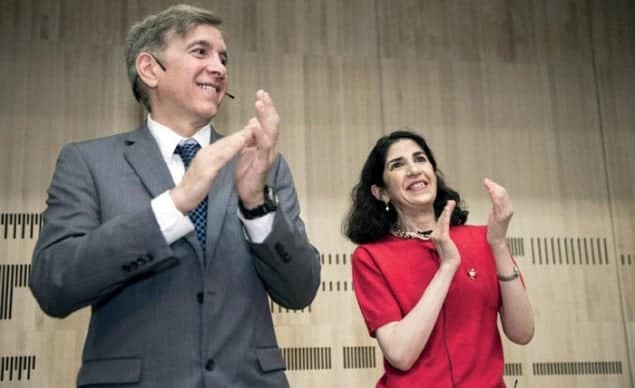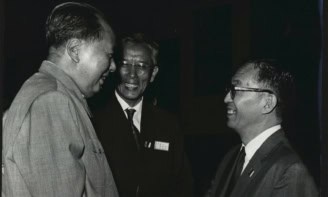
A massive $3m in prize money is to be shared by seven physicists who headed CERN’s Large Hadron Collider (LHC) and its two main experiments – ATLAS and CMS – since 1994. The award – given for the discovery of a Higgs-like particle at the LHC – is one of two “special fundamental physics prizes” from the Fundamental Physics Prize Foundation, which was set up earlier this year by the Russian physicist-turned-entrepreneur Yuri Milner. Another prize of $3m has gone to the British cosmologist Stephen Hawking for his work on black holes, quantum gravity and the early universe.
One of the winners at CERN – CMS spokesperson Joseph Incandela – told physicsworld.com that he was “very happy” to win the prize. “It recognizes the huge effort of so many great people who provided so much creativity and brilliance to the experiments and the LHC accelerator complex that made this all possible,” he says. “I am honoured to be the leader of the experiment now, but I am like many others in the experiment who have spent 15 or 20 years of their career on this project.”
The six other CERN physicists to share in the prize are Lyn Evans, who masterminded the construction of the LHC, current ATLAS spokesperson Fabiola Gianotti and her predecessor in the job Peter Jenni, as well as Michel Della Negra, Guido Tonelli and Tejinder Singh Verdee, who are all from the CMS collaboration.
In an e-mail to the Guardian newspaper, Hawking said that “prizes like these play an important role in giving public recognition for achievement in physics” but added that “no-one undertakes research in physics with the intention of winning a prize”.
Fundamental matters
The Fundamental Physics Prize Foundation has also announced the winners of its three 2013 Physics Frontiers prizes. One Frontiers prize has gone jointly to Charles Kane of the University of Pennsylvania, Laurens Molenkamp of the University of Würzburg and Shoucheng Zhang of Stanford University for their prediction and discovery of topological insulators. The second award goes to Alexander Polyakov of Princeton University for his work on field theory and string theory, while the final prize is given to Joseph Polchinski of the University of California, Santa Barbara.
These winners of the Frontiers prizes all go on the shortlist for the 2013 Fundamental Physics Prize, which is worth $3m and will be awarded in March. Any Frontiers winner who does not scoop the main prize will still receive $300,000 each.
The foundation has also revealed the three winners of its 2013 New Horizons in Physics prizes. These are Niklas Beisert of ETH Zürich for his work on quantum gauge theory and string theory, Davide Gaiotto of the Institute for Advanced Study in Princeton for “far-reaching insights” into duality, gauge theory and geometry, and Zohar Komargodski of the Weizmann Institute of Science for his work on 4D field theories. Each theorist will receive $100,000.
Yuri Milner, 51, originally studied theoretical physics at Moscow State University but dropped out of a PhD in theoretical physics at the Lebedev Physical Institute. After a stint working at the World Bank in Washington, DC, he turned to investing in start-up companies, apparently making his millions by investing in Internet firms such as Facebook, Twitter and Zynga. The October 2012 issue of Bloomberg Markets magazine named him as one of the 50 most influential people who “move markets or shape ideas or policies”.



